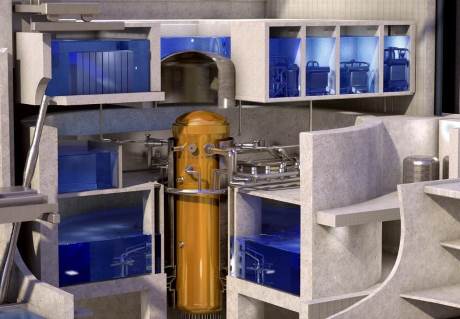GEH, DTE extend cooperation on ESBWR design
06 October 2015
GE Hitachi Nuclear Energy (GEH) and DTE Energy have announced plans to explore advancing the detailed design of the Economic Simplified Boiling Water Reactor (ESBWR). DTE received a licence earlier this year to build and operate an ESBWR at its Fermi plant, but the utility has yet to decide whether to go ahead with the project.
 |
| A cutaway of the ESBWR design (Image: GE Hitachi) |
On 30 April, the US Nuclear Regulatory Commission (NRC) approved DTE Energy's combined construction and operation licence (COL) for Fermi 3, the first construction licence to be awarded for GE Hitachi's ESBWR reactor design. The licence authorizes DTE Energy to build and operate the unit at a site adjacent to its operating Fermi 2 boiling water reactor in Michigan.
At that time, DTE said it "has not committed to building the new plant, but will keep the option open for long-term planning purposes."
GEH and DTE have now said they will continue to cooperate on the development of the ESBWR design.
GE Hitachi chief operations officer Jay Wileman said, "DTE and GEH will further expand our cooperation by determining resource requirements and developing plans to advance the ESBWR design, enabling DTE Energy to be in a position to more readily begin work should the utility decide at a later date to add more carbon-free, baseload power to its energy mix."
The ESBWR received design certification from the NRC in September 2014. The 1600 MWe reactor includes passive safety features which would allow it to cool itself without the need for external electricity supplies or human intervention, and also uses fewer pumps and mechanical drives than reactors with so-called active safety systems.
A second ESBWR COL application, for Dominion Virginia Power's North Anna 3, is under consideration by the NRC. According to GEH, that project is expected to receive a licence in 2016.
Applications were also submitted for ESBWRs at Entergy's Grand Gulf and River Bend sites, as well as by Exelon for a new site in Victoria County in Texas, but all of these have been either suspended or withdrawn.
Researched and written
by World Nuclear News